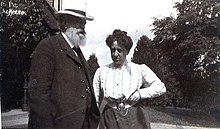Friedrich Baumfelder

Friedrich August Wilhelm Baumfelder (born May 28, 1836 in Dresden , Kingdom of Saxony ; † August 8, 1916 there ) was a German composer , cantor , conductor and pianist .
Life
He was the third of a total of seven children. His father Carl Friedrich Gotthelf was a senior teacher and director at the royal Saxon garrison school "Rath und Tath" in Dresden and contributed significantly to the reform of the Saxon education system with his Bell-Lancasterian teaching method of mutual instruction. His mother was Friederike Ernestine (1806–1882). Music, especially sacred music, was very important to the Baumfelder family. Friedrich's musical talent led to the publication of his first works when he was only 14 years old. His brother Gustav (1839–1925) also carried on the parental legacy. He became a pastor and protadiacon in Zittau and a church musician.
Friedrich Baumfelder received his musical training from the cantor of the Dresden Kreuzkirche, Ernst Julius Otto, and from Johann Schneider , an important Saxon court organist at the time. He studied at the famous Leipzig Conservatory with Ignaz Moscheles and Moritz Hauptmann .
In Dresden he worked as a music teacher and gave piano lessons. For this purpose, he created albums with self-composed pieces for children and young people. His most famous student was Georg Schumann .
Friedrich Baumfelder got a job as cantor at the Dreikönigskirche in Dresden. In 1863 he married Emma Skrimshire, an Englishwoman from Longthope. The marriage produced five sons and two daughters. He stayed for a long time in England, France and America . He published a large number of his works there.
In 1875 he was appointed director of the Robert Schumann Singing Academy and headed it for several decades. The Dresden Liedertafel was also under his leadership for two years . In their memorial from 1936 it says:
“On May 28th, It is 100 years since Friedrich Baumfelder was born. Many Dresden residents will still remember the tall old man with the white, flowing hair under the broad hat [...] Friedrich Baumfelder also emerged as a composer with several oratorios, the setting of the 40th Psalm (which he performed with the Liedertafel and many soloists) and other works [...] The story of the Liedertafel tells of him that he was a zealous and always ready conductor, endowed with the most amiable qualities. She also reports under him about a great Sedan concert in 1877 (a reminder of the famous patriotic song table evenings during the war of 1870/71) and a singing tribute at the silver jubilee of the royal majesties in Pillnitz in 1878 . - The Dresdner Liedertafel will commemorate its former musical leader by laying a wreath on the Trinitatisfriedhof [...] "
Friedrich Baumfelder's grave in the Trinity cemetery has not been preserved.
Compositions
A special weight of his musical work lay in the composition. His numerous works include a symphony , an opera , overtures , piano concertos, a few motets , a suite and a piano sonata . Many of his works can be assigned to the term salon music.
Some of his works are now part of the standard programs of students, especially at conservatoires in the USA . Friedrich Baumfelder's level of awareness has recently also grown in Germany. The rondo “Good Humor” was also performed publicly with German soloists, the motet “Danket dem Herr” was recorded on CD by the “Saxon Trumpet Mission” , and a few pieces by FAW Baumfelder can be heard on the YouTube video portal .
On Sunday Jubilate , April 21, 2013, the two motets "Barmherzig und gracious is the Lord" and "Thanks to the Lord", with words from Psalm 103 and 106, on the occasion of the consecration of the Christophorus Church in Dresden-Leuben by Cantor Dr. Chins listed again. The scores of both motets for mixed four-part choir have been discovered in the Dresden State and University Library.
Works (selection)
The selection of these works does not represent an evaluation. The catalog raisonné by Friedrich Baumfelder shows over 400 compositions. Many of his works seem to have been lost in the chaos of the Second World War .
- Transcriptions élégantes… / No. 3 / Choeur des soldats de l'opera: "Faust" de Gounod
- Marche militaire pour piano, op.65
- Transcription brillante sur l'air anglais: God bless the Prince of Wales pour Piano, op.67
- Valse brillante de l'opéra "Romeo et Juliette" de Ch. Gounod, op. 165
- Peasant Dance. op. 208, No. 5 in G major
- Styrienne pour piano. Bulkhead. Mainz. after 1873, op.263
- 10 children's songs by Carl Gärtner: with accompan. the pianoforte (without octave tension). op. 268
- You hear me through the fir trees. Song. Edition for piano with deliberate singing voice. Based on a poem by Julius Schanz. Transcription for pianoforte
- Good humor. rondo
- Coral polonaise. Century Music Publishing Company. new York
- Tyrolienne (Länders). JH Fannce Co., 1910
literature
- Paul - Hand Lexikon der Tonkunst. Leipzig 1870
- Tonkünstler Lexicon. Frank Altmann, 1936
- Dresdner Anzeiger , May 27, 1936
- Research by Claus Scharschuch, Freital, on the family chronicle
- Pazdirek - Universal manual of musical literature
- Saxon Trumpet Mission
- Carl Friedrich Gotthelf Baumfelder (1798–1865) . In: Saxon Biography
- Videos with compositions by Friedrich Baumfelder
- State and University Library Dresden
Web links
- Works by and about Friedrich Baumfelder in the German Digital Library
- Sheet music and audio files by Friedrich Baumfelder in the International Music Score Library Project
| personal data | |
|---|---|
| SURNAME | Baumfelder, Friedrich |
| ALTERNATIVE NAMES | Baumfelder, Friedrich August Wilhelm (full name) |
| BRIEF DESCRIPTION | German composer, conductor and pianist |
| DATE OF BIRTH | May 28, 1836 |
| PLACE OF BIRTH | Dresden , Kingdom of Saxony |
| DATE OF DEATH | August 8, 1916 |
| Place of death | Dresden |